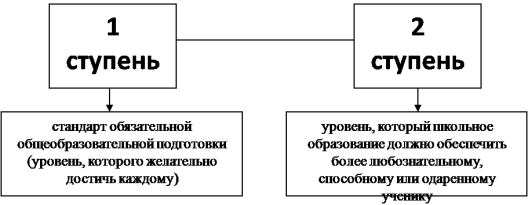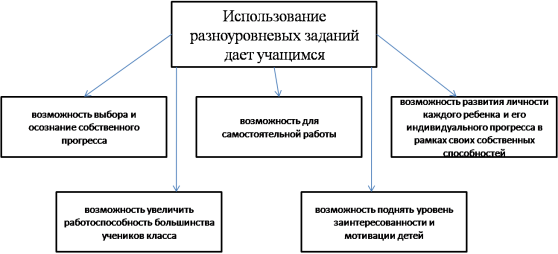На уроках английского языка, в рамках реализации личностно-ориентированной технологии, считается наиболее эффективный разноуровневый подход в выборе дифференцированных заданий на уроках английского языка. Так как личностно-ориентированный подход включает учет различий основной массы учащихся по уровню усвоения учебного материала. Мы можем выделить две ступени:

Между первой и второй ступенями лежит определенной пространство, состоящее из разноуровневых, разнообразных видов деятельности.
Индивидуализацию обучения, а также дифференциацию, возможно, обеспечить за счет разноуровневых заданий. Необходимость создания комплекса заданий по различным видам деятельности говорение, чтение, письмо и аудирование является важным аспектом в данном контексте.

Разноуровневые задания по чтению
Текст 1.
The biggest football competition in the world is the World Cup. This is how it all started.
The organizers of the Olympics decided not to include football in the 1932 competition, because it was in America and football was not popular there. In 1930, the FIFA president, Jules Rimet, started a world championship for football. He decided to hold it in Uruguay, because they were the best team in the world at that time. At first, European countries did not want to send their teams. The only way to travel a long distance in 1930 was on a ship. European countries said it was too expensive and took too long for them to travel to South America. Finally, Jules Rimet persuaded four European countries to send their teams. There were teams from North and South America and from Europe.
A French player, Lucien Laurent, scored the first goal of the competition. France won their first match, but lost the others. The winners of the competition were Uruguay. They played Argentina in the final. Uruguay won 4–2. They scored their fourth goal in the last minute. 93000 people saw the best team in the world become the first World Champions.
Уровень 1
Прочитай текст ипродолжите предложения.
The World Cup started in …
A Uruguay C 1932
B 1928 D America
Уровень 2
Прочитайте текст. Выберите правильный вариант ответа (a— True, b— False, с— Not stated).
- Europe was too far away to send teams.
a — True b — False с — Not stated
- The French team sent four teams.
a — True b — False с — Not stated
- Uruguay won an Olympic medal.
a — True b — False с — Not stated
Уровень 3
Make up your own story about the world is the World Cup.
Разноуровневые лексико-грамматические задания
Тема «Food»
- Complete the words: bre__d, swe_ts, mil_, but_er, hunn_.
- Match the word and its definition:
1) an apple
a) a long thick fruit with a yellow skin
2) milk
b) an animal which lives in water
3) tea
c) a white liquid produced by cows
- Choose the suitable word:
1) She drink (much/many) tea.
2) He (buys/bought) bread yesterday.
3) These flowers (grow/grows) in different countries.
- Put questions to the sentences starting with the words:
1) Tom drinks coffee for breakfast. (What?)
2) We went to the museum yesterday. (Where?)
3) She drank two cup of tea. (How many?)
Разноуровневые задания по аудированию
Записьтекста «The London Museum»
- Underline the words you have just heard:
sculptures, photos, albums, pictures, documents.
- Choose the right variant:
— The library of the London museum is one of (the biggest / the richest) in the world.
— When you come to the museum you can see (the rest / the Reading) Room.
— Some of (the most famous / the greatest) people have sat in the Reading Room.
- Complete the sentences:
— The London Museum is situated in ___ street.
— There are a lot of _____ in it.
— Many things came to the museum from___.
- Answer the questions.
— Where is the London Museum?
— What is it famous for?
— What pictures can you find in the London Museum?
- Write what have you learnt about the London Museum.
Литература:
- Бим И. Л. Личностно-ориентированный подход — основная стратегия обновления школы.//Ин. языки в школе. 2002. № 2, с.11.
- Бухаркина М. Ю. Технология разноуровневого обучения// Иностр. языки в школе.-2011.-№ 3
- Полат Е. С. Разноуровневое обучение// Иностр. языки в школе.- 2011.- № 6, 2012.-№ 1.







